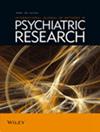The Netherlands Mental Health Survey and Incidence Study-3 (NEMESIS-3): Objectives, methods and baseline characteristics of the sample
Abstract
Objectives
NEMESIS-3 (Netherlands Mental Health Survey and Incidence Study-3) is a psychiatric epidemiological cohort study of the Dutch general population that replicates and expands on two previous NEMESIS-studies conducted in 1996–1999 and 2007–2018 respectively. The main aims of NEMESIS-3 are to provide up-to-date information on the prevalence, incidence, course and consequences of mental disorders, their risk indicators, and to study the relevant time trends. This paper gives an overview of the objectives and methods of NEMESIS-3, especially of the recently completed first wave, and describes the sample characteristics.
Methods
NEMESIS-3 is based on a multistage, stratified random sampling of individuals aged 18–75 years. Face-to-face interviews were laptop computer-assisted and held at the respondent's home. A slightly modified Composite International Diagnostic Interview (CIDI) version 3.0 was used to assess both Diagnostic and Statistical Manual of Mental Disorders-IV (DSM-IV) and DSM-5 mental disorders. Two follow-up waves are planned three and six years after baseline.
Results
In the first wave, performed from November 2019 to March 2022, 6194 individuals were interviewed: 1576 respondents before and 4618 respondents during the COVID-19 pandemic. The average interview duration was 91 min and the response rate was 54.6%. The sample consisted of 50.4% women and had a mean age of 47.9 years. The sample was reasonable nationally representative, although some sociodemographic groups were somewhat underrepresented.
Conclusions
Despite the COVID-19 restrictions, we were able to build a large and comprehensive dataset of good quality, permitting us to investigate the latest trends in mental health status, various new topics related to mental health, and the extent to which the pandemic has had an effect on the population's mental health.

 求助内容:
求助内容: 应助结果提醒方式:
应助结果提醒方式:


